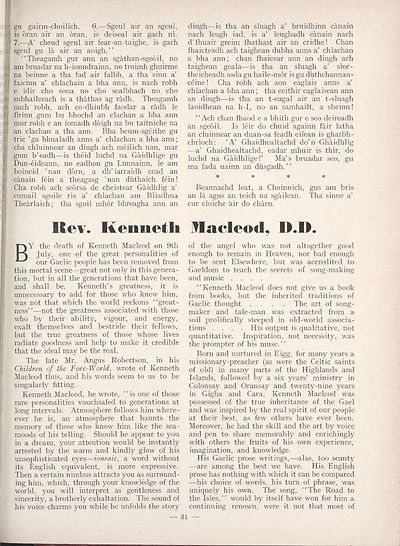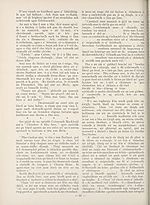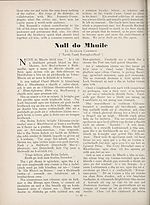An Comunn Gàidhealach Publications > Gaidheal > Volume 49--51, January 1954--December 1956
(341) Page 81
Download files
Complete book:
Individual page:
Thumbnail gallery: Grid view | List view

gu gairm-choilich. 6.—Sgeul air an sgeul,
is oran air an oran, is deiseal air gach ni.
7.—A’ cheud sgeul air fear-an-taighe, is gach
sgeul gu la air an aoigh. ”
“Theagamh gur ann an sgathan-sgeoil, no
am bruadar na h-ionndrainn, no troimh ghuirme
na beinne a tha fad air falbh, a tha sinn a’
faicinn a’ chlachain a bha ann, is nach robh
e idir cho sona no cho sealbhach no cho
subhailceach is a thathas ag radh. Theagamh
nach robh, ach co-dhiubh faodar a radh le
firinn gum bu bhochd an clachan a bha ann
mur robh e an iomadh doigh na bu taitniche na
an clachan a tha ann. Bha beum-sgeithe gu
trie ’ga bhualadh anns a’ chlachan a bha ann;
cha chluinnear an diugh ach meilich uan, mar
gum b’eadh—is theid luchd na Gaidhlige gu
Dun-eideann, no eadhon gu Lunnainn, le am
boineid ’nan dorn, a dh’iarraidh cead an
canain fein a theagasg 'nan duthaich fein!
Cha robh ach seorsa de cheistear Gaidhlig a’
cumail sgoile ris a’ chlachan am Bliadhna
Thearlaich; tha sgoil mhor bhreagha ann an
Rev. Kenneth
BY the death of Kenneth Macleod on 9th
July, one of the great personalities of
our Gaelic people has been removed from
this mortal scene—great not only in this genera¬
tion, but in all the generations that have been,
and shall be. Kenneth’s greatness, it is
unnecessary to add for those who knew him,
was not that which the world reckons “great¬
ness”—not the greatness associated with those
who by their ability, vigour, and energy,
exalt themselves and bestride their fellows,
but the true greatness of those whose lives
radiate goodness and help to make it credible
that the ideal may be the real.
The late Mr. Angus Robertson, in his
Children of the Fore-World, wrote of Kenneth
Macleod thus, and his words seem to us to be
singularly fitting.
Kenneth Macleod, he wrote, ‘ ‘ is one of those
rare personalities vouchsafed to generations at
long intervals. Atmosphere follows him where-
ever he is, an atmosphere that haunts the
memory of those who know him like the sea-
moods of his telling. Should he appear to you
in a dream, your attention would be instantly
arrested by the warm and kindly glow of his
unsophisticated eyes—ionraic, a word without
its English equivalent, is more expressive.
Then a certain nimbus attracts you as surround¬
ing him, which, through your knowledge of the
world, you will interpret as gentleness and
sincerity, a brotherly exhaltation. The sound of
his voice charms you while he unfolds the story
diugh—is tha an sluagh a’ bruidhinn canain
nach leugh iad, is a’ leughadh canain nach
d’fhuair greim fhathast air an cridhe! Chan
fhaicteadh ach taighean dubha anns a’ chlachan
a bha ann; chan fhaicear ann an diugh ach
taighean geala—is tha an sluagh a’ sior-
theicheadh asda gu baile-mor is gu duthchannan-
ceine! Cha robh ach aon eaglais anns a’
chlachan a bha ann; tha ceithir eaglaisean ann
an diugh—is tha an t-eagal air an t-sluagh
laoidhean na h-I, no an samhailt, a sheinn!
“Ach chan fhaod e a bhith gur e seo deireadh
an sgeoil. Is leir do chuid againn fair latha
an cluinnear an duan-sa feadh eilean is gharbh-
chrioch: ‘A’ Ghaidhealtachd do’n Ghaidhlig
—a’ Ghaidhealtachd, eadar mhuir is thir, do
luchd na Gaidhlige!’ Ma’s bruadar seo, gu
ma fada uainn an dixsgadh.”
* * * *
Beannachd leat, a Choinnich, gus am bris
an la agus an teich na sgailean. Tha sinne a’
cur cloiche air do charn.
Raclcod,
of the angel who was not altogether good
enough to remain in Heaven, nor bad enough
to be sent Elsewhere, but was accredited to
Gaeldom to teach the secrets of song-making
and music ....
“Kenneth Macleod does not give us a book
from books, but the inherited traditions of
Gaelic thought .... The art of song-
maker and tale-man was extracted from a
soil prolifically steeped in old-world associa¬
tions .... His output is qualitative, not
quantitative. Inspiration, not necessity, was
the prompter of his muse. ’ ’
Bom and nurtured in Eigg, for many years a
missionary-preacher (as were the Celtic saints
of old) in many parts of the Highlands and
Islands, followed by a six years’ ministry in
Colonsay and Oransay and twenty-nine years
in Gigha and Cara, Kenneth Macleod was
possessed of the true inheritance of the Gael
and was inspired by the real spirit of our people
at their best, as few others have ever been.
Moreover, he had the skill and the art by voice
and pen to share memorably and enrichingly
with others the fruits of his own experience,
imagination, and knowledge.
His Gaelic prose writings,—alas, too scanty
—are among the best we have. His English
prose has nothing with which it can be compared
—his choice of words, his turn of phrase, was
uniquely his own. The song, “The Road to
the Isles, ’ ’ would by itself have won for him a
continuing renown, were it not that most of
is oran air an oran, is deiseal air gach ni.
7.—A’ cheud sgeul air fear-an-taighe, is gach
sgeul gu la air an aoigh. ”
“Theagamh gur ann an sgathan-sgeoil, no
am bruadar na h-ionndrainn, no troimh ghuirme
na beinne a tha fad air falbh, a tha sinn a’
faicinn a’ chlachain a bha ann, is nach robh
e idir cho sona no cho sealbhach no cho
subhailceach is a thathas ag radh. Theagamh
nach robh, ach co-dhiubh faodar a radh le
firinn gum bu bhochd an clachan a bha ann
mur robh e an iomadh doigh na bu taitniche na
an clachan a tha ann. Bha beum-sgeithe gu
trie ’ga bhualadh anns a’ chlachan a bha ann;
cha chluinnear an diugh ach meilich uan, mar
gum b’eadh—is theid luchd na Gaidhlige gu
Dun-eideann, no eadhon gu Lunnainn, le am
boineid ’nan dorn, a dh’iarraidh cead an
canain fein a theagasg 'nan duthaich fein!
Cha robh ach seorsa de cheistear Gaidhlig a’
cumail sgoile ris a’ chlachan am Bliadhna
Thearlaich; tha sgoil mhor bhreagha ann an
Rev. Kenneth
BY the death of Kenneth Macleod on 9th
July, one of the great personalities of
our Gaelic people has been removed from
this mortal scene—great not only in this genera¬
tion, but in all the generations that have been,
and shall be. Kenneth’s greatness, it is
unnecessary to add for those who knew him,
was not that which the world reckons “great¬
ness”—not the greatness associated with those
who by their ability, vigour, and energy,
exalt themselves and bestride their fellows,
but the true greatness of those whose lives
radiate goodness and help to make it credible
that the ideal may be the real.
The late Mr. Angus Robertson, in his
Children of the Fore-World, wrote of Kenneth
Macleod thus, and his words seem to us to be
singularly fitting.
Kenneth Macleod, he wrote, ‘ ‘ is one of those
rare personalities vouchsafed to generations at
long intervals. Atmosphere follows him where-
ever he is, an atmosphere that haunts the
memory of those who know him like the sea-
moods of his telling. Should he appear to you
in a dream, your attention would be instantly
arrested by the warm and kindly glow of his
unsophisticated eyes—ionraic, a word without
its English equivalent, is more expressive.
Then a certain nimbus attracts you as surround¬
ing him, which, through your knowledge of the
world, you will interpret as gentleness and
sincerity, a brotherly exhaltation. The sound of
his voice charms you while he unfolds the story
diugh—is tha an sluagh a’ bruidhinn canain
nach leugh iad, is a’ leughadh canain nach
d’fhuair greim fhathast air an cridhe! Chan
fhaicteadh ach taighean dubha anns a’ chlachan
a bha ann; chan fhaicear ann an diugh ach
taighean geala—is tha an sluagh a’ sior-
theicheadh asda gu baile-mor is gu duthchannan-
ceine! Cha robh ach aon eaglais anns a’
chlachan a bha ann; tha ceithir eaglaisean ann
an diugh—is tha an t-eagal air an t-sluagh
laoidhean na h-I, no an samhailt, a sheinn!
“Ach chan fhaod e a bhith gur e seo deireadh
an sgeoil. Is leir do chuid againn fair latha
an cluinnear an duan-sa feadh eilean is gharbh-
chrioch: ‘A’ Ghaidhealtachd do’n Ghaidhlig
—a’ Ghaidhealtachd, eadar mhuir is thir, do
luchd na Gaidhlige!’ Ma’s bruadar seo, gu
ma fada uainn an dixsgadh.”
* * * *
Beannachd leat, a Choinnich, gus am bris
an la agus an teich na sgailean. Tha sinne a’
cur cloiche air do charn.
Raclcod,
of the angel who was not altogether good
enough to remain in Heaven, nor bad enough
to be sent Elsewhere, but was accredited to
Gaeldom to teach the secrets of song-making
and music ....
“Kenneth Macleod does not give us a book
from books, but the inherited traditions of
Gaelic thought .... The art of song-
maker and tale-man was extracted from a
soil prolifically steeped in old-world associa¬
tions .... His output is qualitative, not
quantitative. Inspiration, not necessity, was
the prompter of his muse. ’ ’
Bom and nurtured in Eigg, for many years a
missionary-preacher (as were the Celtic saints
of old) in many parts of the Highlands and
Islands, followed by a six years’ ministry in
Colonsay and Oransay and twenty-nine years
in Gigha and Cara, Kenneth Macleod was
possessed of the true inheritance of the Gael
and was inspired by the real spirit of our people
at their best, as few others have ever been.
Moreover, he had the skill and the art by voice
and pen to share memorably and enrichingly
with others the fruits of his own experience,
imagination, and knowledge.
His Gaelic prose writings,—alas, too scanty
—are among the best we have. His English
prose has nothing with which it can be compared
—his choice of words, his turn of phrase, was
uniquely his own. The song, “The Road to
the Isles, ’ ’ would by itself have won for him a
continuing renown, were it not that most of
Set display mode to:
![]() Universal Viewer |
Universal Viewer | ![]() Mirador |
Large image | Transcription
Mirador |
Large image | Transcription
| An Comunn Gàidhealach > An Comunn Gàidhealach Publications > Gaidheal > Volume 49--51, January 1954--December 1956 > (341) Page 81 |
|---|
| Permanent URL | https://digital.nls.uk/127176513 |
|---|
| Description | This contains items published by An Comunn, which are not specifically Mòd-related. It includes journals, annual reports and corporate documents, policy statements, educational resources and published plays and literature. It is arranged alphabetically by title. |
|---|
| Description | A collection of over 400 items published by An Comunn Gàidhealach, the organisation which promotes Gaelic language and culture and organises the Royal National Mòd. Dating from 1891 up to the present day, the collection includes journals and newspapers, annual reports, educational materials, national Mòd programmes, published Mòd literature and music. |
|---|---|
| Additional NLS resources: |
|

